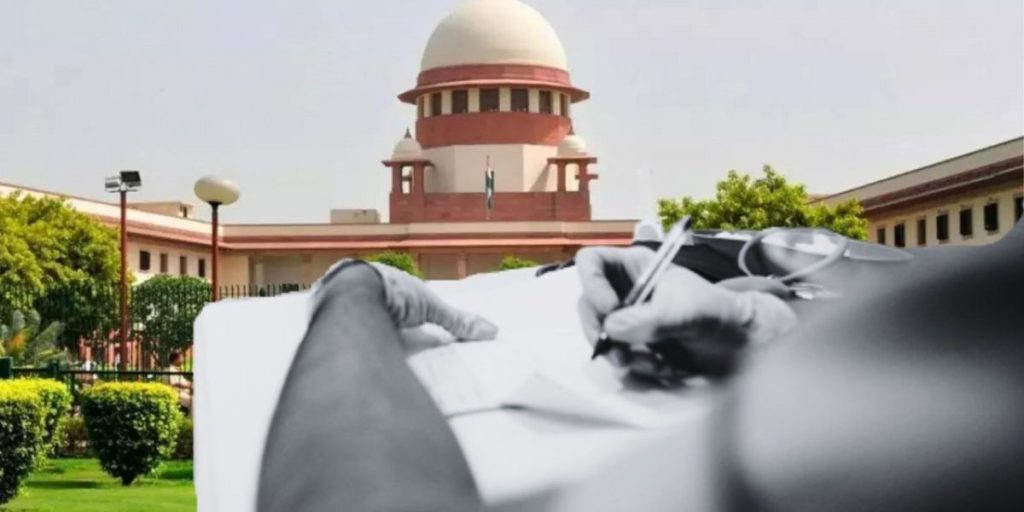The Union government has made it clear in the Supreme Court that it thinks that the current voluntary code in place to prevent bribing of doctors by pharmaceutical companies is ‘adequate’, The Wire has learnt.
It has told the court that it was not in favour of making – ‘in haste’ – a law to this effect that will change the status of the code from voluntary to mandatory.
A Supreme Court hearing in August in an ongoing case where the petitioner demanded a legal instrument in this connection has brought the alleged physician-pharma nexus under fresh spotlight. Apex court judge Justice D.Y. Chandrachud had described the issue as ‘serious’. Justice Chandrachud had also remarked that it was ‘music to his ears’ when he got to know that the manufacturer making an antipyretic drug ‘Dolo’ had allegedly spent exorbitant amounts of money on marketing.
At the heart of the issue is a code – Uniform Code of Pharmaceutical Marketing Practices (UCPMP) – which prohibits pharmaceutical companies from giving ‘freebies’ to doctors.
It was put in place on January 1, 2015, and does not have legal backing. The code was initially brought for a period of six months only so that it could be reviewed afterwards. However, the code got an extension later and it will remain in force as it is till another such instrument comes.
“It is humbly submitted that the writ petition gives an incorrect impression that the extant legal regime is insufficient and inadequate to protect the citizens from unethical marketing practices by the pharmaceutical companies in their dealings with healthcare professionals,” the government has said in reply in the Supreme Court.
The government also said UCPMP is working ‘adequately, as per the provisions of the Code’.
By telling the court that the UCPMP is working just fine, the government has, in fact, gone back on its own position from 2017 – one which it had maintained for three years. There are many instances which attest to this.
The annual report of the department of pharmaceuticals (DoP) which was published 2018, said:
“The implementation of the UCPMP has been reviewed in consultation of all the stakeholders including NGOs/Civil Societies and it was felt that in order to implement it more effectively, it would be desirable to make it mandatory.”
The DoP functions under the union ministry of chemicals and fertilisers.
This was not the first time that the DoP had felt the need for a mandatory code. It had floated a proposal back in 2017 to have some sort of legal instrument in place instead of a voluntary code. The DoP presented to the Union law ministry a draft ‘Essential Commodities (Control of Unethical Practices in Marketing of Drugs) Order, 2017’. The idea was to make it a part of the Essential Commodities Act.
However, that proposal of DoP could not make a cut with the law ministry which believed that the scope of the Essential Commodities Act was only to regulate the production, supply and distribution of essential commodities and not necessarily control the marketing aspect. But the DoP thought that taking recourse to the Essential Commodities Act was the best way and, therefore, it sent a couple of reminders to the law ministry, too, to expedite its proposal.
“The Department has been sent a proposal to Department of Legal Affairs for vetting the draft Drugs (Control Marketing) order-2017 under Section 3 of the Essential Commodities Act 1955 vide its file of even number dated 28/06/2017,” a letter written by an official of the DoP on December 26, 2017, said. “May I request you to look into the matter and to expedite the same,” it added.
The DoP was consistent with its stance. In fact, replying to a Right to Information (RTI) application filed by one Kameswar Rao, a Visakhapatnam resident, the DoP said on December 26, 2017, “…after reviewing the implementation of the Uniform Code for Pharmaceutical Marketing Practices (UCPMP) which is at present voluntary is being examined in consultation with Ministry of Law to make it statutory (sic).”
Replying to a question in the parliament on May 10, 2016, the then Union minister for chemicals and fertilisers, Ananth Kumar, had also said, “The voluntary code was not working as expected.”
So for three years – 2016, 2017 and 2018 – the government maintained that the UCPMP was not working well. However, in 2019, it makes a 180° turn with Minister of State (MoS) for health and family welfare saying in parliament in reply to a question of Rajya Sabha MP K.C. Ramamurthy that all was well with the code. A year later, the government repeated the same thing in 2020 in the parliament, and said the code would not be made mandatory.
What led to the change in the stance of the government is not clear.
Read : https://sankalpanews.com/rublev-too-good-for-sinner-at-canadian-open/
